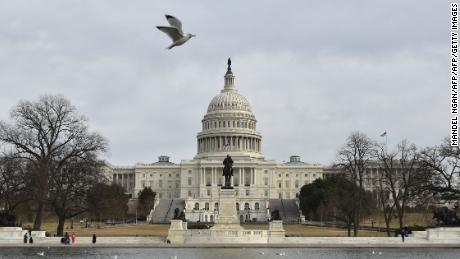(CNN)Why lawmakers can't pass laws -- If you think Washington can't get anything done, it's probably because of the filibuster, the custom in Senate rules that requires a supermajority to end the debate on legislation and vote on it.
Lawmakers have abused, chipped at, worn down and changed the practice over the course of US history, but it seems very likely that we're close (if not next year, then in the years to come) to the moment when it's finally snipped out of the Senate rulebook altogether.
Which is a real tragedy if you pine for the time when Southern senators could speechify for months on end to stomp on civil rights. For everyone else, it's cause for celebration.
Former President Barack Obama endorsed scrapping the filibuster if that's what it takes to pass a new Voting Rights Act to protect access to the polls for all Americans.
"And if all this takes eliminating the filibuster -- another Jim Crow relic -- in order to secure the God-given rights of every American, then that's what we should do."
(Note: It's not a bold prediction to say that in today's political climate, that's exactly what it will take to pass a new Voting Rights Act. That's exactly what it will take.)
That puts Obama in league with Sen. Elizabeth Warren of Massachusetts and other progressives already planning an end to the filibuster should they seize a Senate majority in November. Sen. Bernie Sanders of Vermont echoed Obama's call after the former president's speech Thursday.
This is fast becoming the standard position of Democrats.
Senate Minority Leader Chuck Schumer, a New York Democrat, has not yet endorsed the idea, but he hasn't ruled it out, either. Look for his thoughts on this. That's important. It's also important that moderate Democratic Sen. Joe Manchin of West Virginia is against the idea. It would take a simple majority of 51 to change Senate rules.
Who else opposes the filibuster? Oddly, Obama's call to end the filibuster puts him in league with President Donald Trump, who has repeatedly complained about it. This is not shocking. Presidents have long groused about the slow-moving Senate.
What is this thing and why does it exist?
The idea of the filibuster -- from a Dutch word for "pirate," according to the Senate website -- is that the Senate should live up to its reputation as the world's greatest deliberative body and really consider and debate matters of great import before voting on them and making them law. But honestly, it's mostly self-indulgent senators who view the Senate that way.
What the filibuster is not -- at least not anymore -- is the use of impassioned speeches lasting for many hours to change minds. In practice today it is a generally unified blockade by the minority -- today it's Democrats, it'll be Republicans at some point -- against anything the other party wants to do.
Perverted over time. Except the use of the filibuster -- to prevent the Senate from a "cloture" vote on a bill to cut off debate -- has metastasized to the point where pretty much everything requires 60 votes. Here's a 25-page Congressional Research Service report on the history and use of the filibuster and cloture, or, further in the parlance of Senate-speak, "Rule XXII."
The practice dates back, in some form, to the 1850s. It was fine-tuned by Southerners to obstruct civil rights legislation in the 1950s and '60s, changed in the '70s, weaponized by both parties in the 2000s and then mastered by Sen. Mitch McConnell during the Obama administration.
McConnell has warned Democrats not to mess with the rules. "The legislative filibuster is directly downstream from our founding tradition," he wrote in The New York Times in 2019. "If that tradition frustrates the whims of those on the far left, it is their half-baked proposals and not the centuries-old wisdom that need retooling."
I'm pretty sure he's talking about the founding tradition of the Senate there because the Founding Fathers failed to mention it anywhere at all.
Putting it more bluntly, McConnell also wrote, "You'll regret this, and you may regret this a lot sooner than you think."
An explosion of filibusters. In the '50s and '60s, cloture would be filed once or a handful of times every two years. It's been filed 263 times so far in this Congress. Because there are rules about how long to debate a bill once a cloture motion is filed, floor managers have to game out a timetable for every piece of legislation.
The practice has evolved in other ways too. It used to take 67 senators -- two-thirds of those voting if all 100 senators vote -- to cut off debate. That's what it took in 1964, when the epic filibusters of civil rights legislation were finally broken. Back then it took just 34 senators to stop something. Today you need 41. But in this hyper-partisan climate, it's hard to imagine a filibuster-proof majority like the one Democrats enjoyed briefly under Obama in 2009.
Why keep the filibuster? Supporters argue that without it, you'll have top-down rule by the majority party and minority voices, powerless to block things, will be drowned out. If Democrats control Capitol Hill, it'll be Nancy Pelosi and Schumer running wild. If Republicans take control, it would be their opportunity to change everything.
The choice, then, is action or gridlock? If Democrats take the Senate and update its rules, they'll be choosing both for themselves and Republicans, when they control government. See McConnell's threat above. Congressional elections every two years will become even more important as a check on power and to direct the focus of the country.
Senators have already encountered and live in a post-filibuster world when it comes to presidential appointees. Under Democratic leadership, senators whittled away at the use of filibusters on most nominees. Under Republican leadership, they ended it completely by changing the rules to confirm Supreme Court nominees Democrats had tried to block using the filibuster.
There are already ways around the filibuster for legislation. Recent major legislation has often needed a creative end-run around the filibuster. Democrats still ultimately had to get creative with the budget process, which is exempt from the filibuster, to pass the Affordable Care Act, after Sen. Edward Kennedy died and they lost that 60th vote.
That's also how Republicans passed their 2017 tax overhaul bill, which permanently lowered the tax rate for US corporations and temporarily lowered the rates for most people. Never mind the irony of using budget reconciliation rules to pass a law that will add trillions to the national debt.
In both cases, one party controlled the House, the Senate and the White House. They had won big in elections. Senate rules don't care about elections. That these creative maneuvers exist and are exploited makes you wonder why the filibuster should exist at all.




